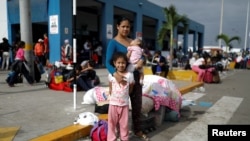The European Union and the U.N. refugee agency appealed Monday for support for millions of Venezuelans who have fled the political crisis, and for help to bolster the poverty-wracked country's neighbors as they strain under the burden of hosting most of them.
The South American nation of roughly 30 million people is gripped by a deepening political and economic crisis. People live in fear of anything from violent street protests to a massive power failure. The International Monetary Fund says inflation is expected to hit a staggering 200,000% this year.
Around 4.5 million people have fled Venezuela in recent years to escape low wages, failing basic services and a lack of security, and the numbers will soon surpass the 5.6 million who've left conflict-ravaged Syria since 2011 if departures continue at the same rate.
"This is most underfunded refugee crisis in the world. The international community is simply not doing enough, and I have the impression that it's not aware enough of the gravity and urgency of doing more," EU foreign policy chief Federica Mogherini said in Brussels, where the two-day ``solidarity conference'' is taking place.
"The U.N. appeals for 2019 have remained underfunded and the requests for 2020 should not suffer the same fate," she said, warning that "the needs stemming from this humanitarian emergency continue to outpace the response."
Refugee agencies estimate that around 85 percent of those who have fled remain in Latin America and the Caribbean. Colombia hosts the greatest number of refugees and migrants _ an estimated 1.4 million Venezuelans _ while Peru is sheltering some 860,000. Chile, Ecuador and Brazil have each taken in hundreds of thousands more.
"Host country budgets are strained to the limit; their resources diminishing, their institutions and their infrastructure overburdened," said U.N. High Commissioner for Refugees Filippo Grandi. "This is key issue of this conference."
Despite popular goodwill and many acts of charity, resentment is slowly rising among some of the citizens of Venezuela's neighbors as money is spent to help the displaced.
Until an elusive political solution can be found, Grandi warned, more international support is needed, "and fast."
While the event — the first such meeting for Venezuelan migrants outside Latin America — is not a donor conference, some countries are expected to pledge money, given the dire need for health care, job, documentation and education services, beyond the basic requirements like food and shelter.
Organizers hope the meeting, which involves around 170 delegations from governments, international agencies and charity groups, will lead to a donor conference next year.




